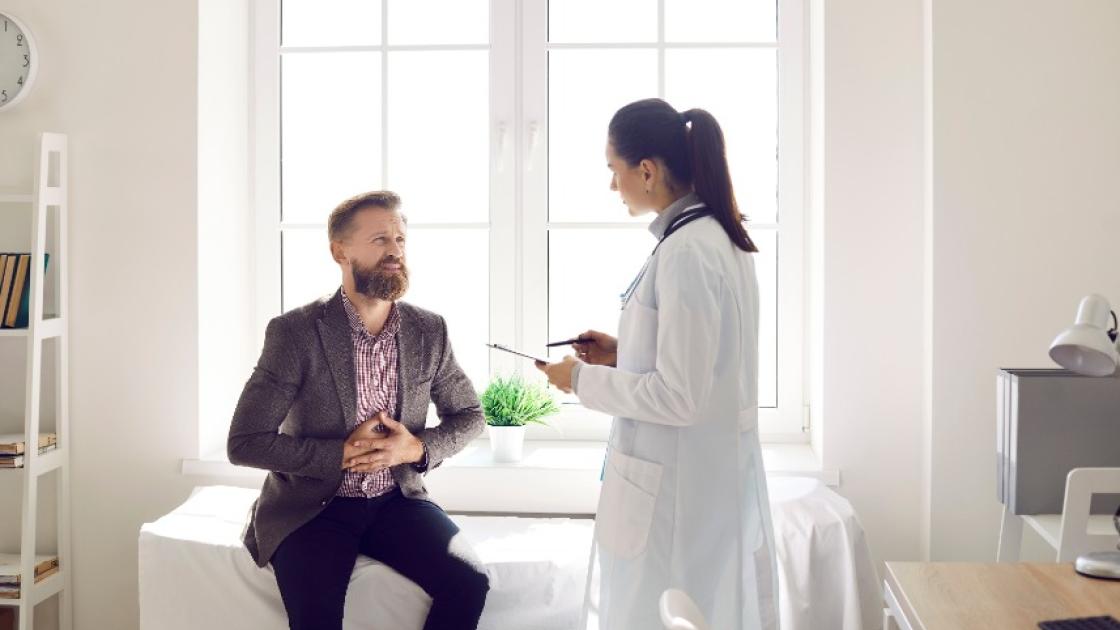
What to expect: your first visit to a gastroenterologist
A gastroenterologist is a medical doctor who specializes in the diagnosis and treatment of conditions involving the gastrointestinal (GI) tract. The GI tract includes several organs and structures, such as the esophagus, stomach, small intestine, colon, rectum, pancreas, gallbladder, bile ducts and liver.
Were you or your loved one recently referred to a gastroenterologist? Knowing what to expect at your first appointment will help you feel more at ease and ensures you get the most out of your time with your provider.
To help you prepare for your initial visit, read on about some things you can expect.
Health history interview
Your first GI appointment will take around 30 to 60 minutes. It will be held in a private room. This face-to-face time is essential for helping our team to get to know you and develop an appropriate plan of care.
To guide diagnosis and treatment, your gastroenterologist will ask several questions about your health, lifestyle and current concerns. These questions make up what we call the health history interview. Expect questions about:
- Your symptoms, including their type, location, duration, intensity, frequency and triggers or precipitating factors
- Your overall health, including whether you're currently being treated for any other medical conditions
- Whether you have a history of surgery, trauma and/or illness affecting your GI tract
- Whether you're currently taking any medication or supplements, including prescription and over-the-counter (it helps to bring a written list!)
Many GI conditions have a genetic component (it runs in the family). Your gastroenterologist may ask whether anyone in your family has ever been diagnosed with a digestive disease or related issue. Be sure to go over your family health history with loved ones before your appointment. That way, you'll be able to provide your doctor with as much information as possible.
During your first appointment, your GI doctor will also review any other pertinent medical information or records from other health care providers that you've agreed to share with our team. This could include notes from your referring physician and pre-appointment lab work.
Physical examination
During your first visit, your GI provider will conduct a thorough physical examination. To ensure this examination is comprehensive and accurate, you may be asked to undress and change into a hospital gown before your doctor enters the room.
Examination techniques may include the following:
- Observation of your abdominal area. Your doctor will visually inspect your abdomen and look for things like scars, rashes and swelling
- Palpation of your abdominal area. Using their hands, your doctor will systematically press on and feel different parts of your belly to check for areas of tenderness, pain, lumps or other abnormalities
- Listening to your abdominal area. Your doctor will put a stethoscope on your belly to hear any sounds coming from your bowels, a process called auscultation.
If necessary, your doctor may perform a rectal examination by gently inserting a lubricated, gloved finger into your rectum. This allows them to assess your rectal muscle tone and check for any masses, bulges or other issues.
Before your gastroenterologist enters the room, a nurse may also collect other objective data about your health, including your weight, height, temperature, heart rate and blood pressure.
Diagnostic tests and lab work
At SIU Medicine, our gastroenterology doctors diagnose, treat and manage a wide range of GI-related conditions, including Crohn's disease, irritable bowel syndrome, ulcers, stomach cancer, esophageal and colorectal cancer, as well as hepatitis and other liver diseases. To help rule in or out certain conditions and to guide treatment, your doctor may order additional tests and techniques, including:
- Blood and/or stool samples
- X-ray
- CT scan
- Colonoscopy
- Upper GI endoscopy
- Barium swallow or enema
Some of these tests can be done on the same day as your initial visit, or may need to be done later during a follow-up appointment. Before any procedure or technique, your doctor will discuss the indications, risks and benefits to make sure you're well informed. You are also encouraged to ask questions at any time! Our front office team is also available to answer any questions about scheduling, billing and insurance.
Looking for a gastroenterologist in Southern Illinois?
Contact SIU Medicine today to find a doctor whom you can trust for your GI health needs.




